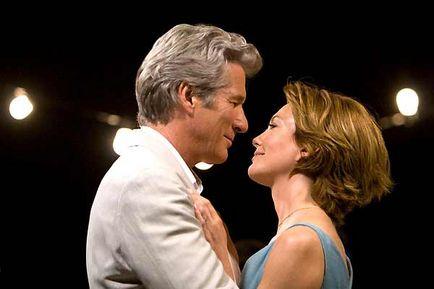Director: George C. Wolfe
Starring: Richard Gere, Diane Lane, Mae Whitman, ScottGlenn
UK Release date: 17 October 2008
Certificate: PG (97 mins)
Nights in Rodanthe, adapted from a bestselling novel by Nicholas Sparks, is a 'middle-aged' romance that seems to owe more than a little to The Bridges of Madison County. Once again, a housewife who has devoted her energies to everyone but herself indulges in a brief, intense, secret affair with a stranger. Once again, that affair is doomed. Unfortunately for this film though, the makers haven’t quite understood what it was about Madison County that made it so moving, and so successful.
Diane Lane plays Adrienne (oddly pronounced “Adrian”), selfless loving mother to a small asthmatic boy and brattish teenage girl, and wife to a rat who left her for a younger woman. The story starts with the Rat arriving at the family home to take the kids for the weekend. Getting Adrienne alone, the Rat makes an unconvincing declaration of love. He wants to move back in with the family. Before the kids leave, the brattish daughter (Mae Whitman) pressures Mom to take Dad back. Instead of putting her feet up once Rat and kids have left, Adrienne must pack her bags as she has promised to look after a guest house belonging to an old schoolfriend. This is in Rodanthe, an island off the North Carolina coast. She heads off there.
Meanwhile, Paul (Richard Gere) is a workaholic plastic surgeon driving down to the same island. He is heading there because his last patient - a woman from Rodanthe - died under anaesthetic (the odds, we are unreassuringly told, are 50,000 to 1.) Her grieving husband (Scott Glenn, oddly sporting a ‘mod’ Paul Weller haircut) has filed a lawsuit. Ignoring his lawyer’s advice, Gere is on his way to confront Glenn. Gere has booked into the only guest house on the island.
That’s the setup to our story, but it already contains two glaring mistakes.
The first mistake is the director’s. The husband should have been far more sympathetic, so that Adrienne can have a real dilemma later. Instead, the Rat is so snakey the audience immediately knows he won’t regain Adrienne’s love, and can be dismissed from the story.
The second mistake is in the script. When we meet Paul we don’t see him at work as a surgeon. We see him as a man driving a fast car wearing stylish clothes (more on his wardrobe below.) Since his backstory - his dilemma - is only told in fleeting flashbacks, we aren’t given much of a chance to identify with him and his problems. Put simply, Diane Lane is a believable mother but Gere ain't a believable doctor.
And since we don’t believe for one moment that Adrienne will get back with her Rat husband, the only interest later in the movie - once Paul and Adrienne have got it together - is how her kids are going to react to the news of Mom’s dishy new boyfriend. Alas, this is not enough plot to hang a whole movie on.
Script weaknesses are exacerbated by some less-than-believable production design.
For a distraught man who has dropped everything to drive frantically across country, Paul appears to have taken an entire wardrobe of new clothes with him. Each new scene sees the dashing surgeon in another smart-casual outfit (think Lands End catalogue). The guest house itself – a beautiful Edward Hopperesque weatherboard villa standing alone on a deserted beach – is as spanking new as the Doc’s wardrobe. Despite generations of sun and seaspray there isn’t even a blister in the paintwork.
This guest house is conveniently empty for our two lovebirds to be alone. Not only is Gere the only guest, but for some odd reason no maids or cleaners work here. The yokels down at the village may mutter about a lethal hurricane sweeping along the coast, but we are reassured to find the hurricane is only a script device - its sole function to get Adrienne into Paul’s arms. The tornado is polite enough to leave the picturesque villa unscathed.
There is a lot of clunky dialogue in the film, particularly as our two lovers shimmy up to their first kiss. Adrienne recklessly, and quite out of character, decides to get drunk on whiskey shots with the stranger she has just met. Once inebriated, they play basketball in the kitchen, lopping out-of-date cans of food into the bin. Picking up a tin of lard, Paul exclaims, “Do you know what this stuff does to your body?” With insider knowledge like this we conclude Paul must be a medical man.
Later in the film a series of letters between the lovers are read out in voiceover. Your yawning reviewer was reminded of low-budget Brazilian soap-operas from the 1980s.
If I’m beginning to sound like a jaded cynic who is unmoved by romantic fiction, be assured this is not the case. I wept watching The Bridges of Madison County.
The emotional climax of that film was not the moment when Meryl Streep and Clint Eastwood got it together. The climax was Meryl’s renunciation – when she decided NOT to open the door of her husband’s truck and run into the arms of her lover.
What Nights in Rodanthe completely lacks is anything like that decisive moment. Diane Lane’s performance is top notch, but it can’t make up for the fact that her character never has to make a crucial decision like Streep’s character had to make.
In Nights in Rodanthe a series of clumsy plot devices and some bad weather make all her decisions for her.
Peter Bridgman
![]() Visit this film's official web site
Visit this film's official web site






